14 US Presidents And Their Favorite Boozy Drinks
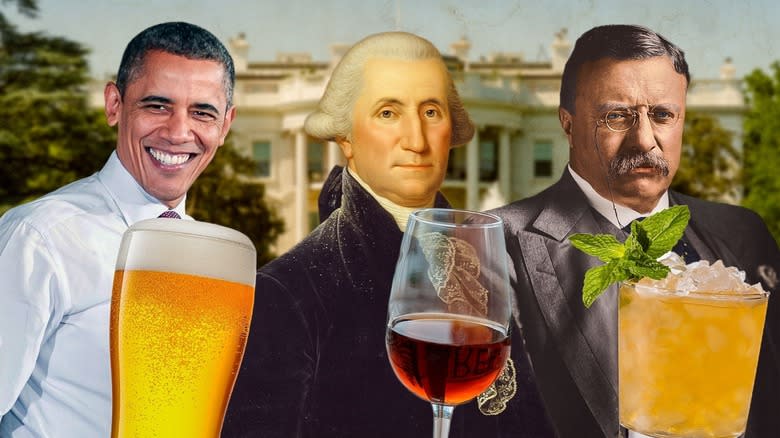
- Oops!Something went wrong.Please try again later.
- Oops!Something went wrong.Please try again later.
- Oops!Something went wrong.Please try again later.
- Oops!Something went wrong.Please try again later.
- Oops!Something went wrong.Please try again later.
- Oops!Something went wrong.Please try again later.
- Oops!Something went wrong.Please try again later.
America's history with alcohol may be complicated, but not so much for its commander-in-chief. After all, starting with George Washington, nearly every U.S. president liked to imbibe -- and not just on special occasions.
Now, the nation's first president (and his fellow Founding Fathers) drank far more regularly than we do today. Safe drinking water was harder to find in the 1700s and 1800s, so beer, wine, and spirits were often seen as less risky choices. Of course, while alcohol consumption has declined over time -- and was briefly outlawed entirely during Prohibition -- it hasn't stopped entirely when it comes to Oval Office occupants.
Consequently, plenty of White House residents were known to enjoy a hard beverage or two at formal dinners, receptions, or for no particular reason at all. While some presidents didn't drink, most officeholders did. More than that, those presidents who did indulge often had their favorite hard beverage in hand when drinking. Here are 14 U.S. presidents and their favorite boozy drinks.
Read more: 13 Liquors Your Home Bar Should Have
George Washington — Madeira Wine
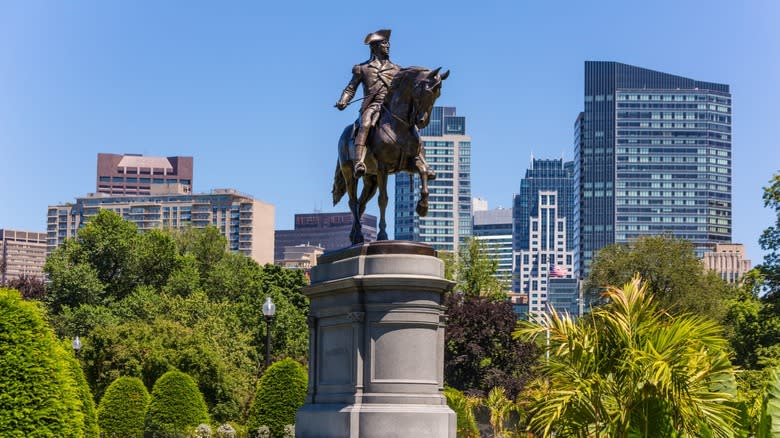
America's first president greatly enjoyed Madeira wine. This makes sense, of course, since Madeira was a popular drink in the colonies. One of the few wines readily available in the U.S. at the time, it was even used by the Founding Fathers to toast the signing of the Declaration of Independence.
While George Washington certainly loved Madeira, the fortified wine (meaning it contains a secondary spirit) that hails from the island of the same name in Portugal was by no means the only drink he consumed. Washington was also a fan of beer -- particularly porters, which he made sure was stocked at his Mount Vernon home when visiting during Congressional recesses.
Additionally, the first American president made his own alcohol and was known to brew beer. He also set up a whiskey distillery with one of his farm partners in the latter days of his presidency, which produced roughly 12,000 gallons of whiskey a year at one point.
John Adams — Hard Cider
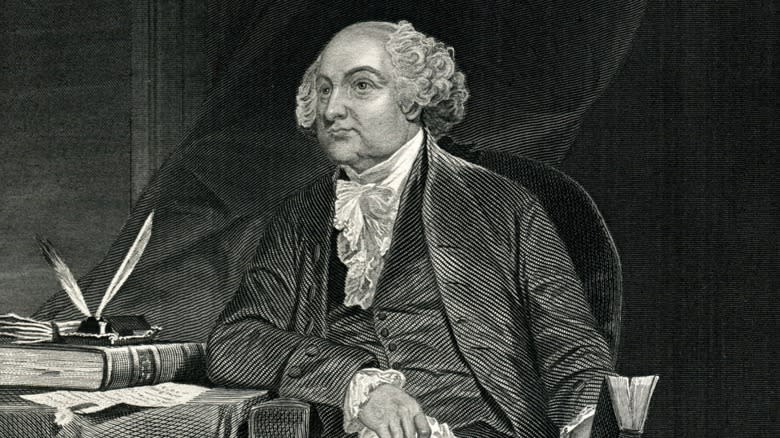
John Adams was famously known to drink hard cider first thing every morning while serving as the nation's second president. For one thing, hard cider was a plentiful choice during that period (as long as there was a good apple harvest), and was often made so the fruit wouldn't rot given the lack of refrigeration. Of course, the president's habit -- which began during his college days and continued throughout his life -- was hardly excessive and only consisted of a 3-ounce shot.
Adams' love of this boozy beverage at breakfast was apparent during his term. Consequently, his wife, Abigail, ensured there was plenty in stock. The president claimed the beverage was necessary for good health and longevity and was upset to learn it was falling out of favor with younger people as he grew older. Since he lived to the ripe old age of 90, maybe he was on to something regarding daily cider consumption.
Thomas Jefferson — Wine
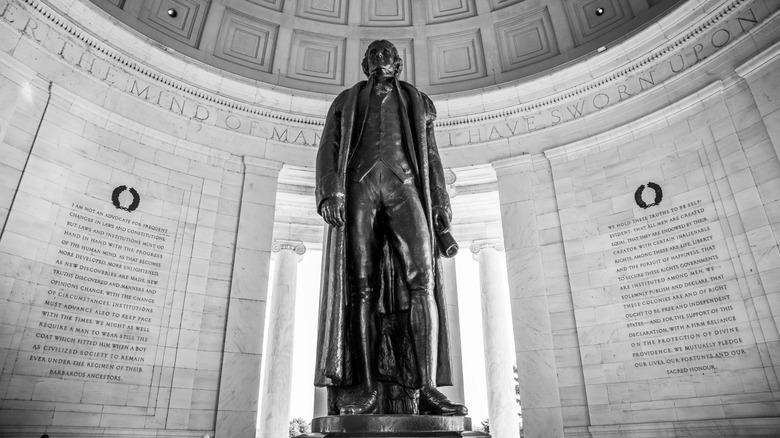
With a predilection for entertaining guests and an extensive love of France, Thomas Jefferson is widely remembered as a wine aficionado. Jefferson hosted so many wine and dinner parties throughout his life that it contributed to his great debt. As president, he held three of these events every week with his administration, guests, and dignitaries, believing there was no better arena to discuss politics and make decisions for the country. But wine wasn't just an indulgence for the third U.S. president -- it was his passion.
Jefferson hosted an Italian wine expert at his home in Monticello to learn more about cultivating grapes in his vineyard. He also had a dumbwaiter exclusively for wine in his home, providing easier access to his wine cellar, which he redesigned after his years in France. Additionally, though Jefferson played an important role in bourbon's history, he made it clear he did not like whiskey. Jefferson wanted to reduce the existing wine tariff of the day so that citizens could replace whiskey -- a drink he believed promoted alcoholism -- with wine.
For him, drinking wine was not only a healthy endeavor. It was more cultured -- and that, too, he felt, would benefit the public. Simply put, Jefferson's love of conversation over a good glass of wine resonates to this day.
James Monroe — Wine
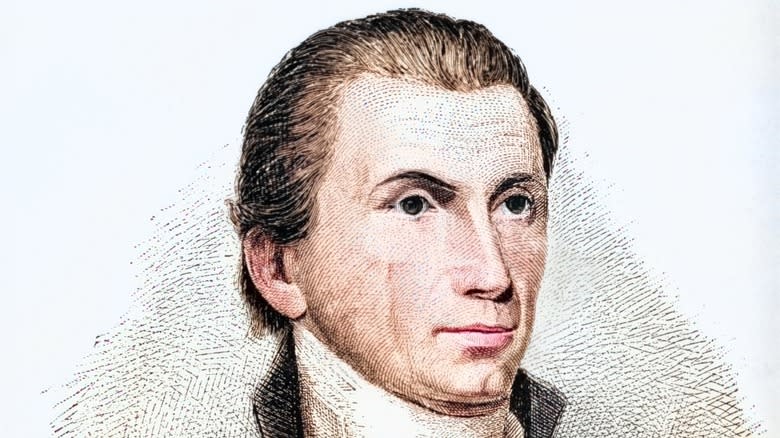
Like Thomas Jefferson before him, James Monroe had an affinity for wine. Monroe had spent considerable time in France serving in a role similar to his presidential predecessor, where he developed a taste for wine and champagne. However, his preference for wine may have derived from Jefferson himself.
After his inauguration, Monroe received a letter from Jefferson with a great deal of advice on buying and storing wine, including details regarding how much to have on hand and what to order. Additionally, while the fifth American president wasn't known to overindulge (perhaps due to his career as a lawyer), he found himself embroiled in a booze-based scandal during his term.
While in office, Monroe ordered 1,200 bottles of French wine on a government account -- but the expense was labeled as furniture. It's unclear whether or not this was a genuine mistake, but it wasn't the first (or last) time a government official was accused of appropriating funds for an unofficial purpose. Monroe may have used his legal prowess to stay out of trouble, though one wonders if the whole brouhaha would've taken place if Jefferson had sent a less detailed congratulatory letter.
Andrew Jackson — Whiskey
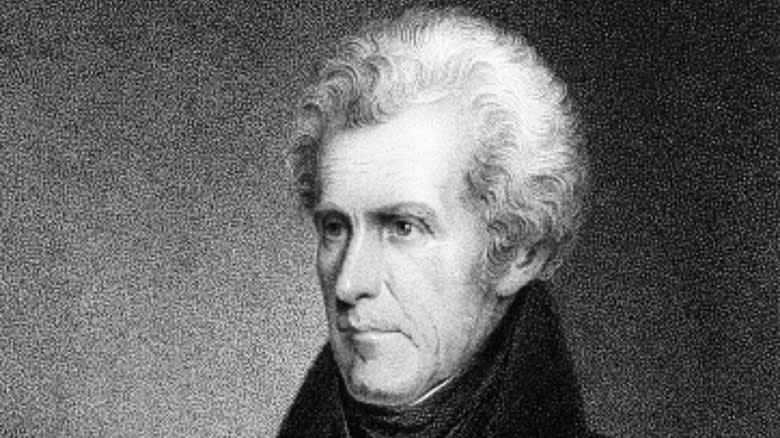
Living most of his life in Tennessee, it's no surprise Andrew Jackson's favorite drink was whiskey -- specifically, a locally distilled version. More than that, Jackson distilled his own liquor (before, during, and after his presidency), and even owned a distillery starting in the early 1800s. First elected in 1828, Jackson was a two-term president embattled by controversies. However, alcohol didn't appear to be a factor in any of those -- unless you count his inauguration.
To celebrate the event, Jackson opened the doors of the White House and served whiskey punch and wine to the invited masses. Consequently, numerous attendees ended up inebriated and made a wreck of the White House. They surrounded and pressed towards Jackson attempting to talk to him or shake his hand -- leading the newly-elected president to escape the White House to get away.
The presidential residence became an unbridled mess as the party went on. Guests didn't end up leaving until the bowls and bottles of alcohol were taken out and put on the lawn (and one can only imagine what the front yard looked like the next day).
James Buchanan — Madeira Wine
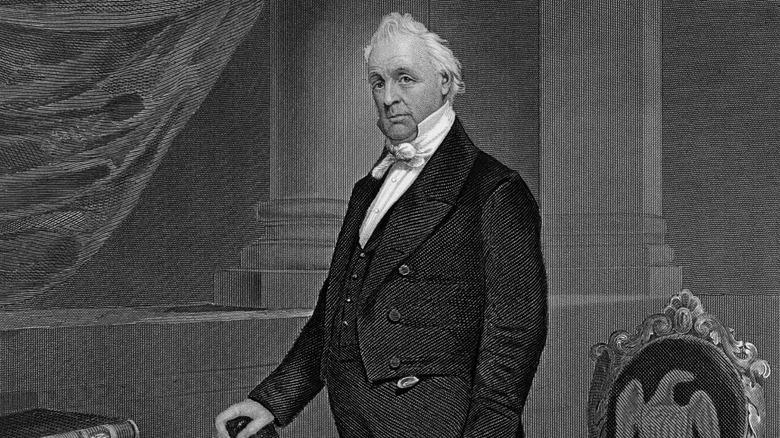
James Buchanan is another (if lesser-known) president who loved Madeira wine. In fact, you'll even find a bottle of 1827 Madeira from his collection on his desk if you visit his home in the 21st century. As a young man, Buchanan loved the spirit so much that he chose Madeira, Portugal as the topic of an assigned essay during his school years.
By the time his presidency began in 1857, the amount of alcohol the average American consumed on a daily basis had diminished slightly from the nation's colonial days. Yet Buchanan was known for his ability to ingest large quantities of alcohol and still function -- whether Madeira wine or otherwise. One contemporary (John W. Forney) witnessed the president down two bottles of cognac followed by rye whiskey without any discernable impairment.
In addition to Madeira and sherry wine, Buchanan grew up enjoying rye whiskey from his native central Pennsylvania. One of his favorite whiskeys was supplied by Jacob Baer and known as Old J. B. Whiskey, which Buchanan enjoyed because he found it amusing to drink whiskey that bore his initials.
Ulysses S. Grant — Champagne
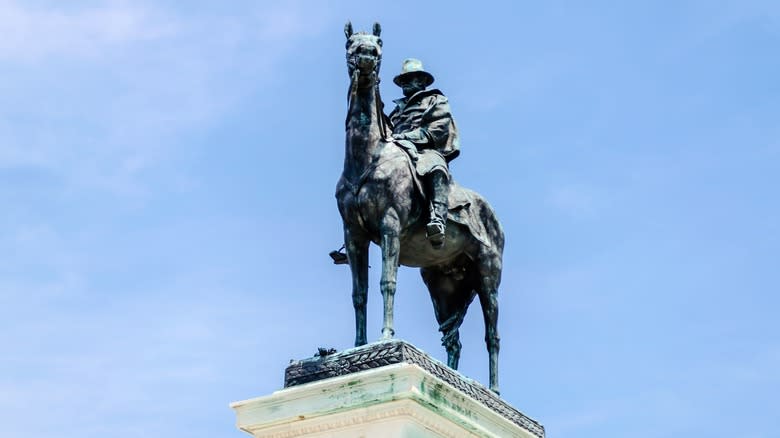
While he had a reputation for hard drinking in his military days -- based on both truth and rumors -- once Ulysses S. Grant became president, he restrained himself from drinking as much as possible. He didn't completely abstain, though, and when he did partake in alcohol, he had a penchant for champagne.
In particular, Grant enjoyed the bubbling wine when entertaining as he liked to treat his guests well. When he hosted a dinner for Great Britain's Prince Arthur in 1870, wine expenses for the evening totaled $1,500 -- more than $44,000 in 2024. On another occasion, the president spent $1,800 on a single bottle of champagne.
The debate regarding Grant's potential alcohol problem -- as well as his time as president -- has never been settled. However, one thing that's certain is that Grant didn't die from alcohol-related health issues (at least not exclusively). Instead, his daily habit of smoking dozens of cigars led to a diagnosis of tongue and throat cancer later in his life, which he perished from the following year.
Theodore Roosevelt — Mint Julep
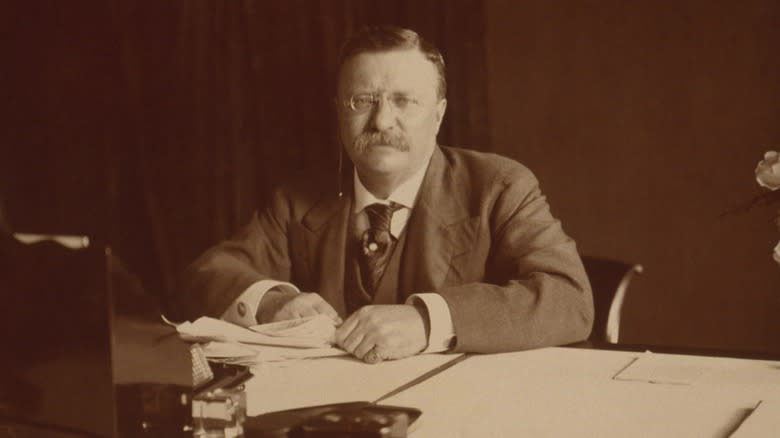
Just weeks before the 1912 presidential election, a newspaper known as the Iron Ore accused former president Theodore Roosevelt of being a drunk, a liar, and a profaner. After losing the election, Roosevelt sued the editor of the paper for libel. During the trial, Roosevelt claimed he'd never been intoxicated in his life -- and his supporting witnesses agreed.
Of course, the president did, in fact, have a favorite drink: mint julep. He allegedly acquired a taste for the cocktail during his presidency thanks to the presence of mint plants growing on the property. At the time, he stated he only drank about half a dozen of these cocktails per year during his entire eight years as president -- and never enough to become genuinely drunk.
In the end, we'll likely never know exactly how much Roosevelt indulged in mint juleps or how much that scandalous article impacted his election chances. Though he lost his attempt at a third term in the White House, he did win his lawsuit (and the story of his favorite boozy drink only adds to the rich history of mint juleps).
Woodrow Wilson — Scotch
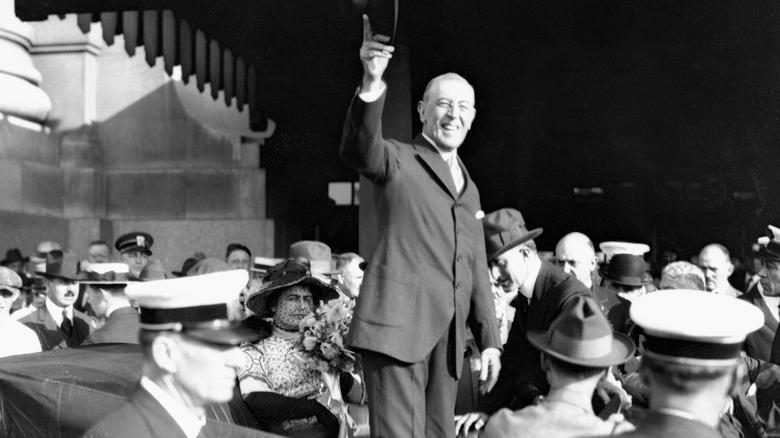
Considering Prohibition began six years into Woodrow Wilson's presidency, it may be surprising that the president enjoyed drinking Scotch (though not excessively). His administration historically failed to stop the passage of the Volstead Act, after all, even though he vetoed it. Since Wilson didn't support the ban on liquor -- nor was he convinced it could be enforced -- many Americans continued to obtain and enjoy alcohol regardless of the laws at the time.
Additionally, although the law that banned the sale, transportation, and distribution of alcohol remained in place when his presidency ended, Wilson had no intention of leaving the White House without the stock of Scotch and wine he had amassed while there. The man responsible for many progressive reforms -- including passing a constitutional amendment granting American women the right to vote -- was not above finding a way around the Volstead Act to serve his own interests. On that note, Wilson received a special allowance from the Prohibition commissioner at the time to transport his reserves to his home in Washington, D.C., including a cask of Scotch.
Franklin Delano Roosevelt — Martinis
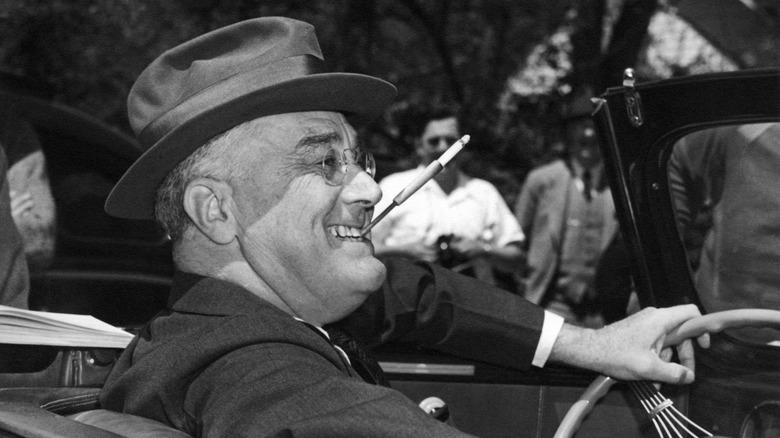
The president affectionately known as FDR was America's only three-term president. Famous for helping the country out of the Great Depression and working to defeat the Nazis in World War II, he also ended Prohibition -- which some may argue is his real claim to fame. In fact, FDR ran on a platform that included the repeal of Prohibition as a top campaign issue in 1933, with his supporters claiming that relegalizing alcohol would boost the economy.
Roosevelt even called for Congress to meet to modify the Volstead Act to legalize beverages with 3.2% alcohol or less during his first week in office. By the end of the year, the 21st Amendment had been ratified and Prohibition had been repealed -- making every aspect of alcohol legal once more. As a result, FDR was able to again drink his beloved martini cocktails legally.
But FDR didn't just enjoy sipping on martinis. He also fancied himself a mixologist and made drinks before dinner events with his staff. He regularly indulged in two or three cocktails himself, teaching his children it was important to know and stick with your alcohol limits. Additionally, he had a reputation for throwing parties at his home in Hyde Park during his presidency, where he invited celebrities to taste the drinks he mixed himself. This included a rum drink called the Haitian libation that he'd invented for the women attending his parties.
Harry Truman — Bourbon
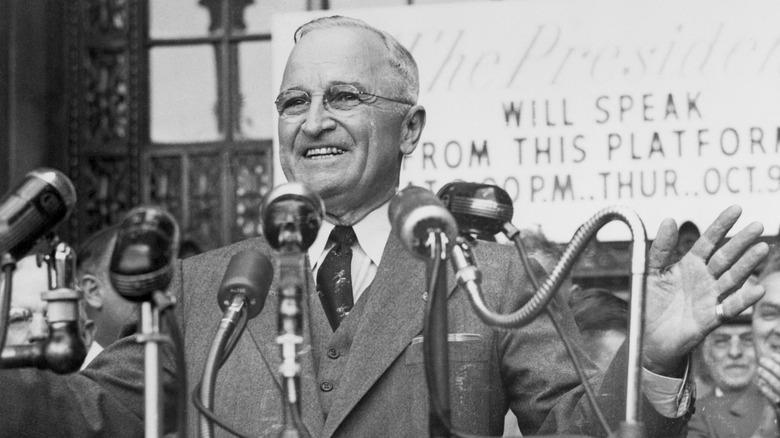
President Harry Truman famously dropped the atomic bomb on Japan and signed the U.N. Charter, but he's also known for his love of bourbon. Writer David McCullough claimed that Truman awoke at 5 a.m. and started his day with a shot of bourbon, as Truman took a daily shot of bourbon with his orange juice after his morning constitutional (a walk). This practice was not uncommon, though, as alcohol was considered healthier at the time and his indulgence came by way of doctor's orders.
Both Truman and his wife, Bess, enjoyed an old-fashioned cocktail before dinner. However, the ones made by the White House staff were too sweet for Mrs. Truman's liking. When the president's wife complained one time that her husband did not like fruit juice mixed in his cocktails, the staff served her a simple double shot of bourbon on ice -- which she felt was the perfect version of an old-fashioned.
Additionally, despite Truman's preference for bourbon, he prohibited grain from shipping to distilleries for 60 days during his presidency. Of course, seeing how he sent the grain to Europe to help people fight starvation on the continent, it seems Truman made the sacrifice for the greater good of the world (even if it potentially put a monkey wrench in his daily bourbon consumption).
Ronald Reagan — California Wine
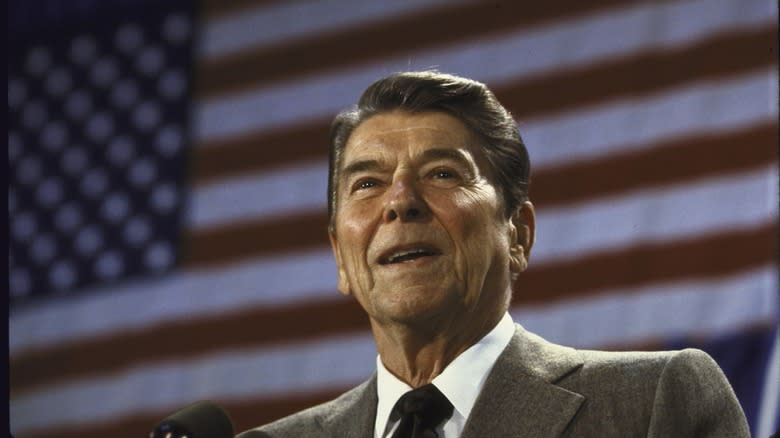
Thanks to his time in Hollywood, Ronald Reagan learned to enjoy California wines and brought this experience to the White House during his presidency. Though French wines were considered the premiere choice to serve dignitaries, heads of state, and celebrities for much of the nation's history, Reagan's chief of staff possessed extensive knowledge and connections with Napa Valley wines. As a result, Reagan became known for serving selections from that region.
Reagan's passion for California vintages was so well known during his time as president that Queen Elizabeth served him California wine instead of French wine once when he visited Buckingham Palace. But Reagan wasn't limited exclusively to California-produced wines. When he wanted to enjoy a cocktail made with hard liquor or a break from wine, he would consume an orange blossom special. The cocktail contained an ounce of vodka, an ounce of grenadine or sweet vermouth, and 2 ounces of orange juice (preferably fresh-squeezed).
Bill Clinton — Snakebite
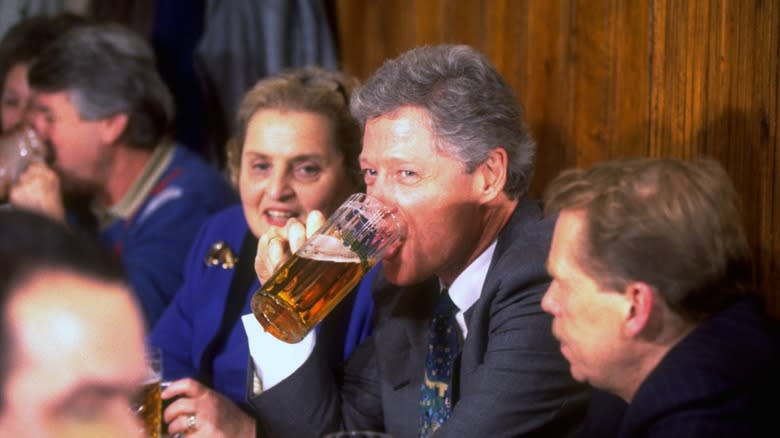
Bill Clinton was not known as a heavy drinker -- which shouldn't be too surprising given his administration passed the law setting blood alcohol limits for drivers. However, when he did drink, he was said to prefer a snakebite. Made of one part lager and one part hard cider, Clinton was once denied this drink at a U.K. pub and told it was illegal. Though the drink wasn't outlawed, some pubs simply refused to serve it -- even to heads of state -- because it's primarily ordered by underage drinkers.
Additionally, Clinton never refrained from drinking when it served a political purpose. In 2000, after his first meeting with Vladimir Putin in Moscow, Clinton drank shots of vodka with his chief of staff John Podesta. While Podesta woke with a blistering hangover, Clinton seemed unaffected, and the then-president was able to meet privately with Boris Yeltsin without issue the next morning.
Clinton was also willing to be photographed with a drink during his term when he thought it would benefit foreign relations. For example, while visiting Northern Ireland, he once ordered a Guinness at a local pub for publicity purposes and was seen with a pint of Greenalls beer at a U.K. pub during the G8 summit in 1998.
Barack Obama — Beer
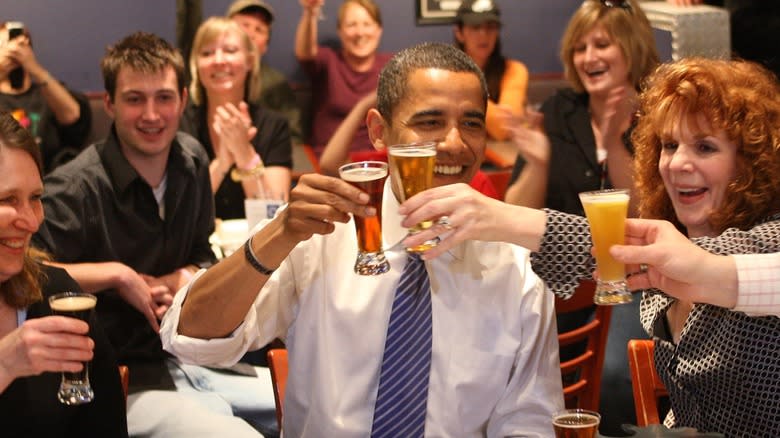
Former president Barack Obama's drink of choice was usually beer. In fact, he once famously held a beer summit at the White House. Furthermore, while several early U.S. presidents brewed their own beer, Obama was the first one to do so at the White House -- serving up a batch of White House Honey Brown Ale at a 2011 Super Bowl party. The honey used to make the beer came from bee hives on the White House grounds, which gave the beer a distinctive flavor that was a hit.
After being petitioned by 1,200 homebrewers, Obama's White House chef Sam Kass shared the recipe for the Honey Brown Ale along with a recipe for a White House Honey Blonde. These recipes were perfectly timed to be released during Obama's 2012 presidential campaign. His beer even caught the attention of Gary Glass, then director of the American Homebrewers Association (AHA), and thanks to Obama's homebrew, both he and Kass received the perk of lifetime membership in the AHA in 2012. That's pretty impressive considering Obama got his first home brewing kit in 2011.
Read the original article on Tasting Table

